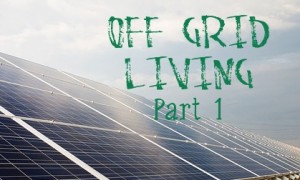 We decided when we moved to our new farm that our house would be off-grid, meaning completely reliant on on-farm generated electricity. We feel that this will force us to reduce our energy usage and ensure that we “walk the walk” not just “talk the talk”. Batteries are definitely the weak link in off-grid systems, so they aren’t for everyone. We may find that grid-tie works better in the future, but wanted to at least try off-grid. We could immediately see that wind power would never have a chance of being adequate here much of the year, so we decided to start with straight solar. Perhaps someday a trompe or steam-powered generator could assist in our power generation, but for now, PV solar will suffice.
We decided when we moved to our new farm that our house would be off-grid, meaning completely reliant on on-farm generated electricity. We feel that this will force us to reduce our energy usage and ensure that we “walk the walk” not just “talk the talk”. Batteries are definitely the weak link in off-grid systems, so they aren’t for everyone. We may find that grid-tie works better in the future, but wanted to at least try off-grid. We could immediately see that wind power would never have a chance of being adequate here much of the year, so we decided to start with straight solar. Perhaps someday a trompe or steam-powered generator could assist in our power generation, but for now, PV solar will suffice.
I have mentioned before that we intend to build a new house soon, but wanted to have time to focus on getting the farm up and running first. Thus, we moved a mobile home to the property and that is our current home. Moving from a large home to a small mobile home is somewhat of a shocker, but that is another topic. The mobile home was previously set up to be very reliant on electricity, so reducing usage was the the first step, as it always should be when designing an off-grid solar system. By reducing electricity needs, we were able to choose a smaller system and thus a smaller battery bank. The biggest consumers were an electric water heater, electric range, and electric dryer. The obvious choices for the first two were propane.
This brings up a dirty little secret about off-grid living: propane. Consuming propane really doesn’t seem all that “green” or sustainable. However, we look at it as a stepping stone to something better. Some cooking and water heating could be done with wood, but we are hopeful that biogas could be a possibility at some point. It may not be practical, but an on-farm biogas digester would be excellent and we intend to research this further and do some small experiments. For now, propane will cover our needs and we’ll do our best to use it sparingly.
We purchased a basic propane range and I extended propane lines to reach it. Easy peasy. Another option could be a an induction range or using an electric range but with automatic generator backup. However, we both like cooking over a gas burner so propane was an easy choice.
The water heater took a little more thought. We considered using a small standard water heater but finally decided that investing in an on-demand unit (Rinnai V65IP) seemed to make sense. This choice fit with our desire to limit our propane use. This again required adding some black pipe to bring gas to the unit and then a vent was added. Nothing too major. I would like to look into using the original electric water heater as a diversion load sometime in the future. Any extra power beyond what is needed to run the home or charge batteries is diverted to this load. In this case, it could be used to heat water. The hot water outlet of the electric tank would be piped into the cold water input of the on-demand water heater.
The clothes dryer will be replaced with a clothes line. On rainy days, indoor lines and racks will be used. The extra humidity will be welcome in the winter when heating with wood. In the summer, the outdoor line will be perfect. Nothing like going from energy hog to zero energy usage! We prefer line-dried clothes anyway, so it should be just fine.
The mobile home does have a propane furnace, but we intend to heat entirely with wood. There was already a wood stove in place and we will use this. Good fire wood is very available on our property and we should never need to cut a living tree for this purpose, unless we are thinning an area for some purpose.
Lighting is a smaller concern, but can chew through more than expected if standard incandescent bulbs are used. Instead, all bulbs were replaced with LED bulbs. Some were already replaced with CFL bulbs by the previous owner. We will continue to use these but do not plan to add any ourselves. We don’t like the idea of adding mercury to our environment. Bulbs do get broken, so we’d just prefer not to contaminate our living quarters!
With all these changes in place, our analysis (you might use something like this) showed that around a 4KW system should be more than adequate. The next few installments will document our system choices and how it all fits together.

Computer engineer turned full time farmer, grazier, builder, permaculturist and volunteer fire fighter. We left corporate America to live a simple, self-sufficient life in the Ozarks. Read more

